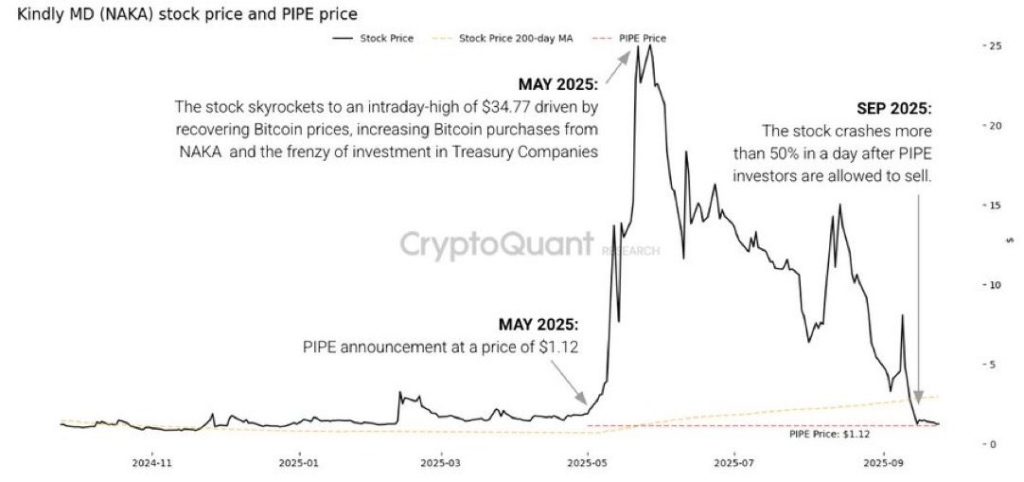Crypto Treasury Stocks at Risk of 50% Crash After PIPE Deals — CryptoQuant Warns
Crypto treasury companies that raised capital through private investment in public equity (PIPE) deals face a growing risk of their stock prices crashing by as much as 50%, according to a new market report from analytics platform CryptoQuant.
The firm said PIPE-backed companies have already suffered steep declines, with share prices often gravitating toward their PIPE issuance levels.
Researchers noted that when lock-up periods expire, investors frequently exit positions to secure profits, creating heavy selling pressure.
PIPE Issuances Create Overhang Across Crypto Treasury Sector, Analysts Warn
PIPE deals allow private investors to buy new shares below market price, offering companies fast access to liquidity in a competitive sector.
While effective for raising cash, CryptoQuant warned that these arrangements dilute existing shareholders and leave an overhang of shares that weighs on stock performance.
One of the starkest examples is Kindly MD (NAKA), a medical company that pivoted into Bitcoin treasury holdings earlier this year.
Its stock surged from $1.80 in late April to nearly $35 by late May after announcing a PIPE raise. However, once PIPE shares unlocked, the stock collapsed 97%, falling to $1.16, almost identical to its PIPE offering price of $1.12.
CryptoQuant described the retracement as a case of “PIPE price gravity.”
 Source: CryptoQuant
Source: CryptoQuant
Other crypto treasury firms may now be following the same path. Strive Inc. (ASST) peaked at $13 in May but has since dropped 78% to $2.75.
CryptoQuant said its PIPE was priced at $1.35, implying the stock could face another 55% decline as investors prepare to sell when the lock-up ends next month.
Cantor Equity Partners (CEP), a special purpose acquisition company merging with Twenty One Capital, also conducted a PIPE priced at $10. CEP’s shares have already slipped nearly 70% from their highs to below $20.
CryptoQuant suggested the stock could fall another 50% from current levels once PIPE investors begin to sell.
The report noted that even well-established crypto treasuries are under pressure as the value of their digital asset holdings approaches parity with their overall company valuations.
This dynamic could further accelerate sell-offs if investors perceive limited upside in stock performance compared to direct crypto exposure.
CryptoQuant concluded that only a strong and sustained Bitcoin rally is likely to counteract the downward pressure facing treasury stocks tied to PIPE deals.
Without such a rebound, it warned that many companies are likely to continue trending toward or below their PIPE issuance levels.
At present, the trend has already left PIPE-funded crypto treasury stocks exposed to sharp losses, with investors closely watching how upcoming unlocks will impact market sentiment in the weeks ahead.
Small-Cap Firms Turn to Borrowing as Crypto Treasury Strategy Falters
On the other hand, the crypto treasury strategy that surged across small-cap firms in 2024 is showing signs of strain as companies turn to debt-funded share buybacks to support collapsing valuations.
According to a CryptoNews report, at least seven firms, including gaming, biotech, and electric vehicle companies, have launched repurchase programs despite trading below the value of their crypto holdings.
Analysts say the trend reflects investor skepticism and undermines the premise that digital assets alone can boost stock performance.
One high-profile case is ETHZilla, formerly 180 Life Sciences, which rebranded after buying ether. Its stock has fallen 76% since August.
The company recently secured $80 million in debt from Cumberland DRW to finance a $250 million buyback.
Critics argue the move signals distress. “They’re borrowing money to buy time, not tokens,” said Kaiko analyst Adam Morgan McCarthy.
Similar tactics are emerging elsewhere. Empery Digital, once Volcon, expanded its debt facility to $85 million despite holding $476 million in Bitcoin, more than its $378 million market value.
SharpLink Gaming, Ton Strategy, and CEA Industries are pursuing comparable measures.
Research from K33 shows one in four public Bitcoin treasuries now trade below their net asset value, with the average NAV multiple falling to 2.8 from 3.76 in April.
Smaller firms such as NAKA and Semler Scientific face mounting pressure, while larger players like MicroStrategy continue to command premiums.
The slowdown in BTC accumulation suggests the once-celebrated crypto treasury playbook may be nearing its limits.
You May Also Like

Solana ETFs Market Grows with Fidelity and Canary Marinade’s New Funds

XRP analysts shift 2025 outlook as liquidity models evolve

